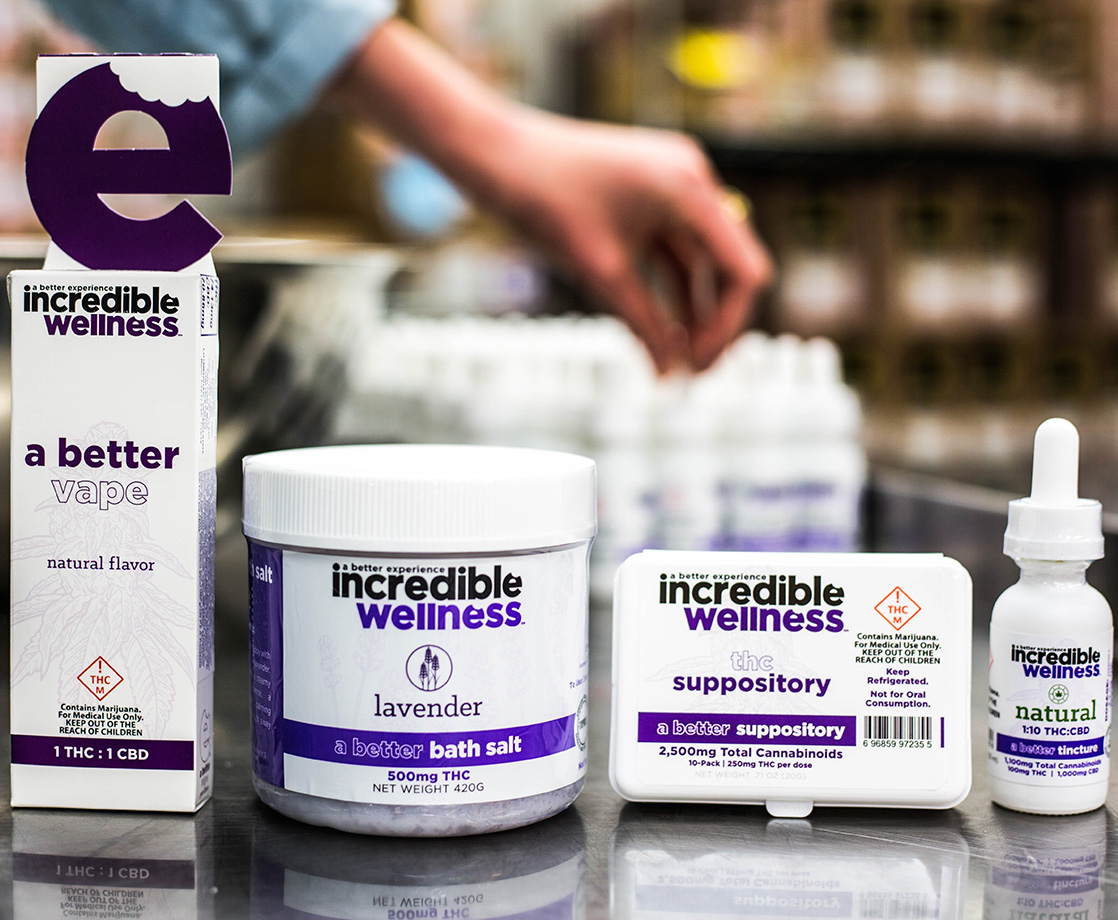All photos courtesy of incredibles and the author
Cannabis patients have long had their pick of edibles, whether chocolates, gummies, mints, or cookies. These days, you can even find infused beef jerky, coffees, or teas. Basically, if it’s digestible, it can be infused.
Which is why incredibles, a company that made its name through chocolate bars, is going the opposite direction: the company’s new Wellness line — under the umbrella of Medically Correct — puts cannabis into everyday items to get much-needed medicine to patients who require more than just buds or a THC-filled cookie.
The Wellness line currently features mainstay items such as vape pens and psychoactive tinctures, but it also includes less conventional products such as infused Epsom salts for hot soaks, and suppositories for patients that need high doses but don't want to — or can't — handle the highs that come with massive quantities of THC.

Bob Eschino, the company's president, said incredibles always planned to launch a non-edible wellness line, but the company's flagship product had proven too popular once the recreational market went live.
"We couldn't keep up with the chocolate bars — for four years," said Eschino. "Which is why none of these other Wellness products have come out yet. But a couple of years ago we finally had a little more bandwidth, and we finally had extra plants on hand." The plants in question are incredibles' in-house genetics, carefully cultivated and maintained to preserve specific cannabinoid and terpene ratios.
"There's so much subjectivity with cannabis in the human body that there's never going to be a catch-all strain for every condition," said Max Eisler, the company's director of cannabis. Eisler oversees everything that involves directly handling the plant, from the grow to the extraction lab. "For example," he continued, "for some people, acetaminophen is the painkiller they take. For others, it's ibuprofen. There's not one answer for every person."
Because patients' experiences fall under a broad, unpredictable spectrum, the Wellness line was designed to employ a variety of doses, delivery methods, and other medicinal plants. For instance, the rub-on pain stick (which is still in the works) incorporates cannabis and arnica, an herb known for its pain-alleviating properties. Getting high is low on the Wellness line's priority list. Getting well, however, is a top concern.

"It's interesting, because people will take all kinds of pharmaceuticals and get high," said Eschino. "For some reason, there are a lot of patients who are afraid of the psychoactivity of cannabis."
The fear is legit. Even long-time cannabis patients can overdo it on THC, which can lead to some scary (but relatively harmless) experiences. Newer patients may not know what to expect from a cannabis product, and others would prefer to avoid getting high altogether because they need to remain functional throughout the day.
"A lot of people didn't want to take the time to build up to their tolerance to get to the levels recommended for them," Eschino continued. Many extremely sick patients, such as those battling cancer or other terminal illnesses, may need doses as high as 1,000 mg of THC a day. Compare that to the meager 10 mg of THC in a single edible serving. "So we figured suppositories would be a great way for even a novice to get high amounts of cannabinoids into their system very quickly and safely."
Suppositories are still uncommon in the Colorado medical market, but anecdotal evidence suggests they're incredibly effective. When cannabis is delivered through a suppository, it will not get the patient high, even with doses reaching the 1,000 mg range. Young children, working adults, new patients, and patients with stubbornly-low tolerances can greatly benefit from cannabis suppositories, which don't possess the same cool-factor as a joint or a vape pen, but that's not what they're for.
"You don't need to get high for symptoms to get treated," said Eisler. "A lot of people think you have to smoke or eat enough to get high for cannabis to work. But less can be more."

"We are creating products designed for women, facial scrub, lotions, and more that men can also use," said Scarpello. "All of us guys go shopping in the females' aisle. Don't let anyone kid you," he added with a grin. "We just do it when nobody's looking."
By next month, the Wellness line will include more products geared toward the normalization of cannabis: infused topical patches, rub-on pain sticks, hair tonics, shampoos, fizzy bath bombs, face masks, scrubs, lotions, and makeup removers.
"Think about that," adds Scarpello. "You're scrubbing your face at night, and you're using soap. It's abrasive and causes irritation. The infused makeup remover would help you take off your makeup, and the lotion heals your skin when you go to sleep. You wake up with baby-like skin in the morning."
The Wellness line's bath salts, which are currently available, offer another innovative option to patients looking for everyday products.
"Bath salts themselves are already good for the body," Scarpello said. "When you add THC and CBD to them, it kicks it up to another level."

How does incredibles get cannabinoids into something as inert as bath salts? He wouldn’t say (it’s a trade secret), but he credits most of incredibles' technological development to one man, Derek Cumings, the company's creative director and another co-founder. "A lot of recipes and products we make came from his brain," Scarpello said. "He's kind of patient number one."
Cumings' job is not easy. Because of strict regulatory restrictions around cannabis products and their distribution, incredibles cannot conduct product testing the way other nutraceutical companies can. State law prevents a licensed cannabis company from freely giving out THC products, even for research purposes. Private citizens in Colorado may donate (not sell) cannabis products to other adults, but licensed businesses cannot.
Instead, Cumings experiments through the legal regulatory system, which has its difficulties but is worth all the time and effort. He then replicates this with his team and through manufacturing processes. The company collects patient and customer feedback for new products after they're packaged, delivered, and sold through licensed retailers. It's this input from employees and customers that lets the company know what they're doing right and how to do it better.
Adds Lily Colley, incredibles' National Director of Marketing: "The mission of incredible Wellness is not only to deliver an unparalleled variety of high-quality, discreet medical cannabis products, but to lobby through our business to help shed light upon the shortcomings of the medical cannabis research system. Due to the federal scheduling of cannabis, medical research is essentially prohibited in the United States. This means patients in non-medical states are often forced to seek pharmaceutical or even un-regulated options. We're excited to see the continued evolution of medical cannabis products throughout the world in the coming decade."

Although Cumings is a business-minded individual, he's a cannabis patient first and foremost. In 1999, he fell from a 50-foot cliff and severely injured his legs. A few years later, he suffered another fall and twisted his back. The damage meant permanent, chronic pain, and his doctors' only solutions were either a life of agony, or a life dependent on pills rife with dangerous side effects.
"I was on a lot of pharmaceuticals at the time," Cumings told MERRY JANE over the phone. "It just made more sense, based on how long the doctors told me I would be on medication, that I needed to make some healthier choices."
Fortunately, in 2000, Colorado's voters approved Amendment 20, the state's medical marijuana bill. Cumings turned to cannabis for relief, and it worked. However, the medical cannabis industry was practically non-existent at the time, so patients and their caregivers relied on home grows, home kitchens, and a lot of experimentation.
"I had to start making my own stuff," he said. "It was trial-and-error over ten years." One of those successful trials was infused Epsom or bath salts, which he still often uses to control his chronic pain.
In the latter half of the 2000s, Cumings owned his own dispensary, but he was forced to shut it down in 2008 after local laws banned dispensaries within municipality limits. After working as a medical cannabis consultant for a short time, he met Scarpello and another of incredibles' founders, Bob Eschino. Scarpello and Eschino had an idea for an edibles company that would take initiative on food-based compliance. At the time, the company only had three employees, and Colorado had not yet implemented rules for manufacturing, testing, or packaging cannabis-infused edibles.
"I said then, if had my way, I wouldn't do cookies or brownies," explained Cumings. "I would do candies with a two-year shelf life, infused with purified cannabis oil. That's one of the most reliable and consistent ways to dose your medicine." By 2009, Cumings' vision coalesced, and incredibles forever changed the game with its top-notch chocolates.
Cumings agreed that getting high isn’t necessary for cannabis to work, but he cautioned against discounting the medicinal benefits of the plant’s psychoactivity, too. "Microdosing is great for people new to cannabis," Eisler said. "But I require much, much higher doses. And as a patient who's been using this medicine for over a decade, I can say it still works for me."
For more on incredibles' wellness-focused product line, visit the company's website here and follow them on Instagram
Follow Randy Robinson on Twitter












